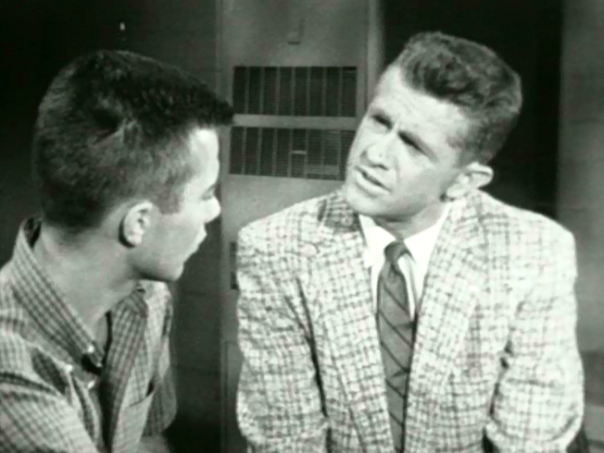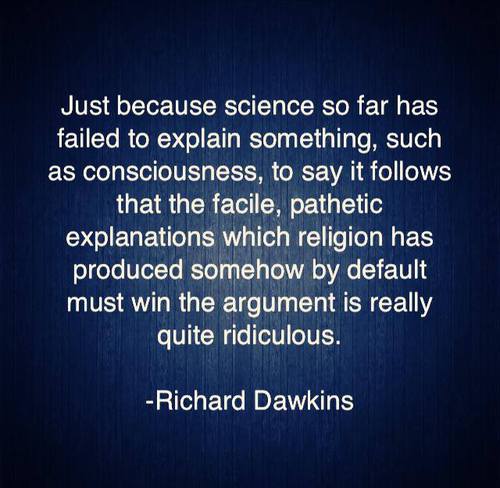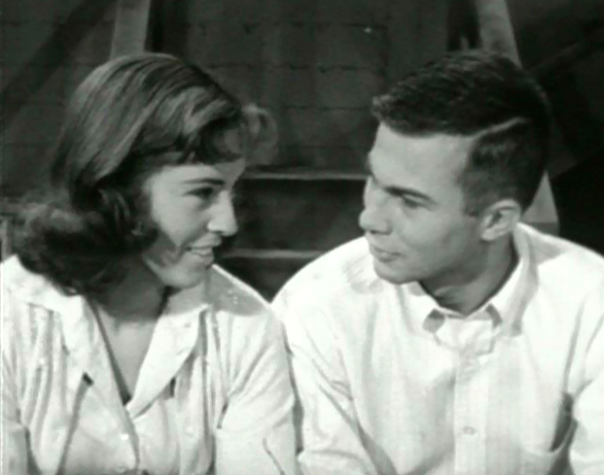Teenage Conflict: Part 2
Well, guys, here is some interesting news: Teenage Conflict can be found on the Internet Archive!
(I didn’t know this before simply because I never tried to find it: I have the Teenage series on DVD from the fine folks at Something Weird.)
And, back in the Teenage world, Doctor George Cooper is here!
Flattop and all! (I know, I know—it was the fashion back then. Still looks dorky as hell. Nice jacket-and-tie combo, too, btw, Doc.)
Joe all but physically drags George away from a conversation with Meg, to get him into the basement and discuss the satellite tracker. And by “discuss the satellite tracker,” Joe means “make sure George doesn’t bring up skepticism in front of Meg.”
But…
IT IS TIME FOR THE BIG REVEAL
Doctor George Cooper…is not an atheist after all!
George: I know it comes as a shock, but several years ago, I came to know Christ. I accepted him as my personal lord and savior.
But, as you may remember from Part 1 of this critique, George had the rep of a skeptic. Turns out, he was misquoted! (No doubt by an eeeevil librul newspaper.)
George: I said there’d be conflict [between science and religion] until each side could see the other’s viewpoint, and realize that under God, there can be but one ultimate truth.
Ha! I love that, I really do! “There will be conflict until people accept that I am right!”
Look, I believe that there will always be conflict between science and religion, too. Because, when you get right down to it, they are two completely different ways of viewing the world. Though I obviously fall on the opposite side of eminent Dr. Cooper.
Of course, I doubt Dr. Cooper will be relying on God to install the electronic brain at the research center. Is he going to pray that God magics the computer into working, or is he going to use his own two hands and his own training and education? Just wondering.
George has a few basic apologetics points to lecture at Joe, but before he gets to that, Doctor George Cooper, eminent scientist, needs to get in a dig at…educated people?
George: One of my troubles was that I failed to realize that the discovery of the whole truth must come from mankind’s total experience. Not just from our so-called “intellectual approach.” *makes face*
Yeah, if there’s one thing scientists just hate, it’s an intellectual approach to a problem!
Who wrote this, honestly?
Whoever it was decided that what this highly educated, eminent Christian scientist would throw at a skeptical high school kid would be…boilerplate apologetics!
George builds his case slowly, but is sure to hit every emotionally sensitive place that he possibly can. (Remember, Joe just told George about Meg’s health issues, and George has no qualms about using this against Joe.)
George: Tell me, Joe: do you love your mother?
Joe: Well, sure.
George: How much?
Joe: A lot!
George: How much is a lot?
Joe: Well, it’s just…um…a lot, that’s all.
George: In other words, you know you love her, but there’s no way you can measure it with a scientific instrument.
Joe: Yeah, I guess that’s right.
George: Well then, just because science can’t measure things like love, faith, and hope, doesn’t mean they aren’t real.
Okay, let’s stop right here.
First of all, George is right that emotions are real. Not just because we feel them and say we feel them, but because they really can be observed by scientific instruments. Sadly, George and Joe are still a few decades away from brain scan technology showing us lasting love.
But even so, does George really want to go down this road, the “emotions are really real” road? Because I am happy to concede that people really do feel faith. But that doesn’t mean the object of their faith is a real thing.
Is God an emotion, George? If it’s “real to you,” is it actually real? Because most Christians I know get quite upset at the implication that God is just an idea, a state of mind, an emotion. To most believers I have met, God is a real being who actually exists.
Not to use the oldest example in the book or anything, but plenty of little kids really, truly believe in Santa Claus. That emotion is real, those feelings are real. Does that make Santa Claus what those kids believe he is: not an emotion or a state of mind, but a real, living person?
Next note: Joe has a good argument that he can present to George in 1960: just because something cannot be quantified, doesn’t mean it can’t be qualified.
How much do you love your mother, Joe? A lot. How much is a lot? More than I love most other people in the world. Enough that I can’t sleep at night, worrying about her health. So much so that I dash home from school every day to help out around the house, so she can nap.
Science hasn’t come up with “love units” yet, to measure quantitatively our love, but really, we can describe anything, even scientific things, in qualitative terms.
How tall are you, Ruby? Five feet, seven inches. Okay, now: how tall are you, without referencing measurement units? I’m taller than my mother, shorter than my father. I’m tall enough that “petite” clothes don’t fit me, but short enough that “tall” sizes are too tall. Okay, but are you tall? I am tall enough to do most of the things I want to do. I am tall in comparison to dogs and cats, but very short in comparison to skyscrapers and mountains.
But no, quantitative and qualitative measurements aside, George really does want to go down that path of arguing that because emotions are real, God is real:
George: You see, Joe, there is more to this world and to human life than demonstrable physical realities. There’s a world of the spirit, which is just as real as the world of chemistry and physical science.
Joe: But how can you prove that it’s real?
George: The overwhelming evidence of 2,000 years proves it.
George, are you seriously ducking this question with an argumentum ad populum? Because that is petty lame of you.
George: God speaks directly to the human heart.
Oh, no, it’s just another piece of wishful thinking from George, who goes on for a bit about Jesus. No attempt at argument here, just a bunch of “Jesus, man!”
George: Well, can you imagine trying to put together [your satellite tracker] by placing all the parts in a barrel, and shaking them [sic] until you had a perfectly working set?
Joe: Hardly.
George: Well, isn’t it even more difficult to imagine that this wonderful universe, about which we still know so very little, could have just happened by accident? *doesn’t give Joe a chance to answer* The more I see of the universe and its wonders, the more it becomes obvious that behind it all is the supreme intelligence we call God, the creator. And that our every attempt to understand the facts of our existence draws us closer to him.
Heh, it’s kinda funny to think that the watchmaker argument was old even back then. And they’ve changed it to the Satellite Trackermaker Argument.
(In case you can’t tell from this and other posts, I am a big fan of the fine folks over at The Atheist Experience. Also, check out The Non Prophets—love listening to them as I walk to work!)
And that is it, you guys. George throws Joe a nice guilt trip (can you prove to me that you love your mom…with science?), some wishful thinking, some boilerplate “Jesus, man!” and the watchmaker argument…and calls it a day.41:22
Joe, by the way, has sat in silence since saying that he could “hardly” envision shaking his satellite tracker in a barrel to make it work. That’s almost a full minute of George blathering on, until he cites John 3:16 and we fade to the next scene.
And Donna, of course, being A Girl, is not fit to hear firsthand these “arguments” against science.
I find it very sad that this is the best that Christian youth films have to offer doubting teens. The watchmaker argument. Do-you-really-love-your-dying-mother?
The filmmakers have also painted themselves into a strange emotional place, and I don’t think they did it intentionally. Here’s why: Meg is having a health scare. Honestly, it kinda sounds to me like she’s dying. So it makes complete sense to me that two impressionable teenagers, still feeling their way towards skepticism in their incredibly fundagelical church, would revert back to the extreme faith of their childhood when confronted with this kind of crisis. Especially because Meg’s faith is so important to her. As Joe so astutely puts it, “it’s about all that’s keeping Mom on an even keel right now.” Not only would sticking with their newfound skepticism be difficult for two kids facing sudden tragedy, with no like-minded adults to help them, but they might feel that the skepticism itself is a very personal betrayal of their mother. Christianity is good enough for mom, and what, are you saying that your dying mother is wrong about something? Wrong about one of life’s Big Questions? What kind of ungrateful, unloving children are you? I have seen this before.
In other words, the film is ultimately implying that none of these apologetics have any power in comparison to a good old-fashioned guilt trip.
The next scene features Joe and Donna hunkered over the satellite tracker again. I guess Joe relayed the apologetics to Donna second-hand, because she now feels all guilty about ever doubting her faith. As well she should, little hussy! What’s next, Donna, thinking you have the right to ask questions in church???
Joe’s loyalty, meanwhile, has turned on a dime:
Joe: I can hardly wait to see Sid’s face when he starts in on George tomorrow at the science club meeting, and George gives him a blast of facts!
Huh. Yanno, Joe, I heard a lot when George was lecturing you in the last scene. But facts weren’t what I heard.
Also, I get that you’re going through a tough time, I really do, but that is no excuse for such a nasty attitude. Sid is your friend, who has never been anything but good to you. And now you’re smirkily looking forward to his public humiliation?
Which, by the way, I am not convinced will happen. First of all, Sid doesn’t seem the kind of guy to “start in on” anyone. He is way too chill for that. As well, I can’t see him being too cowed by this computer scientist he has never met before. Sid’s already stood up to his own parents on this issue, and come out healthy on the other side. George will just be one more fundy adult Sid has to endure until he escapes this stupid, repressive town.
For the first time all movie, Meg and Raymond descend into Joe’s favorite dwelling, just in time to hear the satellite!
Satellite: Beep.
Raymond, just to cement his reputation as resident blowhard, closes with this:
Raymond: Yes, when you get things connected right, you can hear the most wonderful message of all: the one God sent this old world a long time ago.
Oooo, Raymond, what message is that?
God: Hey, kids, here’s a surprise for you: cancer! Enjoy!
Eh, probably not. But we don’t get definitive answer. Instead, Meg and Raymond wander out of the shot, towards Joe’s dank study corner, and Joe and Donna gaze at each other, and the camera lingers so long that it starts to feel creepy.
THE END
Posted on June 29, 2014, in Movies, Teenage Conflict. Bookmark the permalink. 8 Comments.



The hilarious thing is that George the Fundamentalist Scientist only made his case to someone who was already a Christian, with minor doubts. There’s no good reason to presume that Sid won’t effortlessly crush his strawman arguments and leave George going, “Huh, now I remember why I used to not be a Christian” if/when George tries to convert Sid.
(Checks date of film.) “Do you hate the Commies, Joe? But you can’t measure that with a scientific instrument. Just because science can’t measure hatred, that doesn’t mean it isn’t real.”
And for that matter you can’t take a demonstrable physical object and say “this, right here, this is Communism”. Communism is God!
rationalwiki.org is my usual first resort; they also have a good page on Argument from Design.
There are plenty of religious scientists out there. But like every other Christian film in existence, this one has to completely muff up the portrayal. Besides, his role was essentially a blind since, as Ruby pointed out, tragedy can have a “rally ’round the Bible” effect for lapsed Christians. Meh.
That ending, though! WTF?! Is Raymond implying that it’s possible to pick up God on a basement satellite? And then Donna and Joe stare at each other as though they’re about to start making out? I haven’t been this confused and unsatisfied by an ending since I heard the full soundtrack to “Evita.”
“The overwhelming evidence of 2,000 years proves [that there is a world of the spirit].”
Please don’t think too much about the lack of such evidence during the first 38,000 years of human history. Or y’know, the first 13,798,000,000 years of history in general.
I’d also be curious as to what exactly that overwhelming evidence is. Is it like Ruby said, that since a big bunch of people believed in Jesus at some point during those 2000 years*, obviously it must be true? Or do they have any marginally less falacious “evidence”?
* And yes, that is the entirety of the world of the spirit aparently: Jesus. Even the old testament stuff is apparently irrelevant.
I’m not sure that George knows what he means. I get the sense that, if pressed (and Joe doesn’t press him on this, natch), George would either make an appeal to the majority, or pull a “just look around at, like, the sky and the pretty birds and the trees and stuff! The world is too cool not to have been designed by God!”
Thus, Buddhism.
Gotta admit, that wasn’t nearly as facinating a trainwreck as I hoped it would be. The conflict just dully fizzled out. George’s lines are still an admission that many scientists aren’t proper RTCs, but the movie cheats by not allowing any of them on screen.
We don’t even get to see the debate between George and Sid, just the Schadenfreude-tastic anticipation from his alleged friends that Sid is gonna get served tomorrow. The movie didn’t bother with a strawman argument from him or any of those other many stupid scientists who insist on an “so-called intelectual approach”. Lazy bastards.
Oh, and I call BS on that “the discovery of the whole truth must come from mankind’s total experience”-claim. That’s not an approach that the RTCs are all that fond of IMHO. “The Bible says it, I believe it, that settles it!” So “mankind’s total experience” is just code for “whatever my highly conservative preachers claims is the message of the Bible, and treating any contradicting claim as satanic conspiracies to undermine god’s morals.”